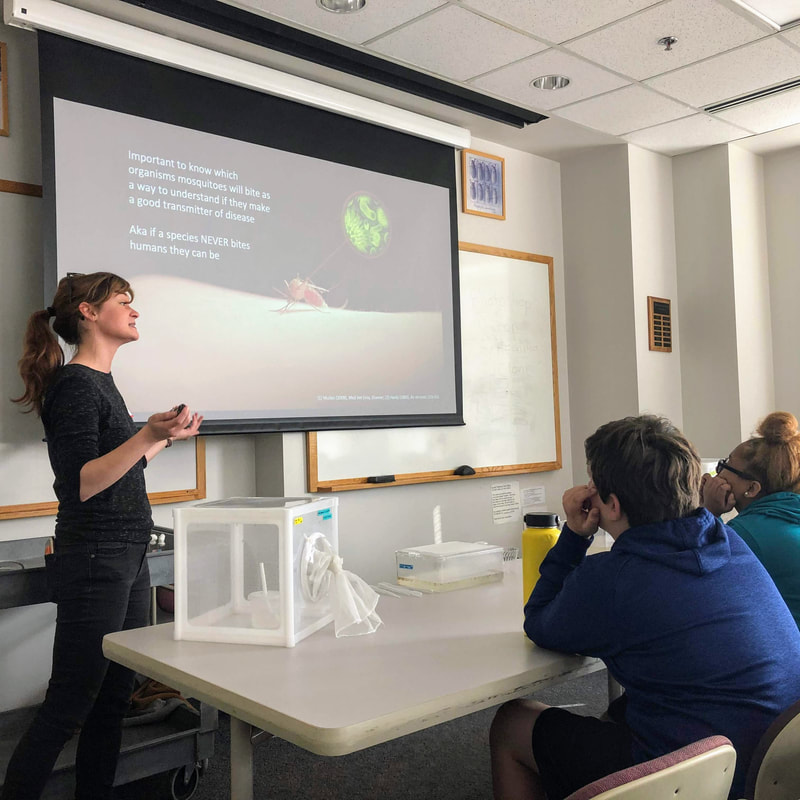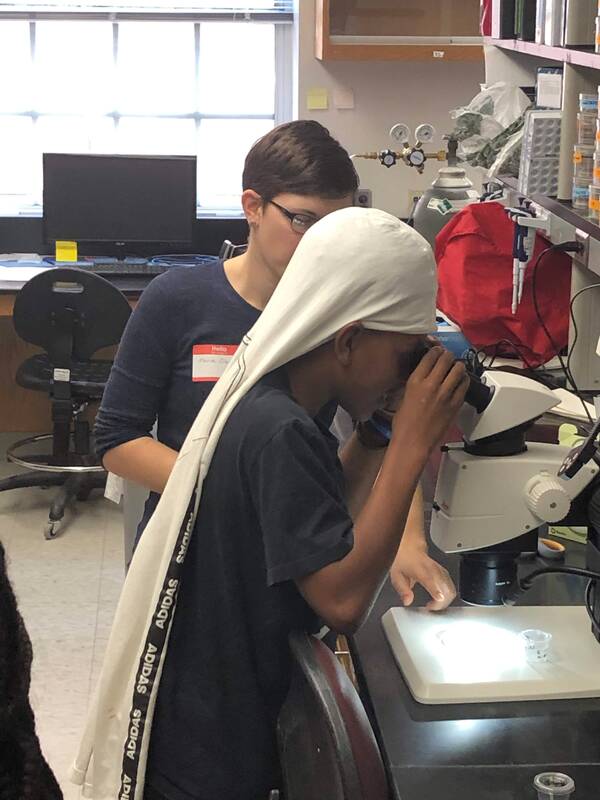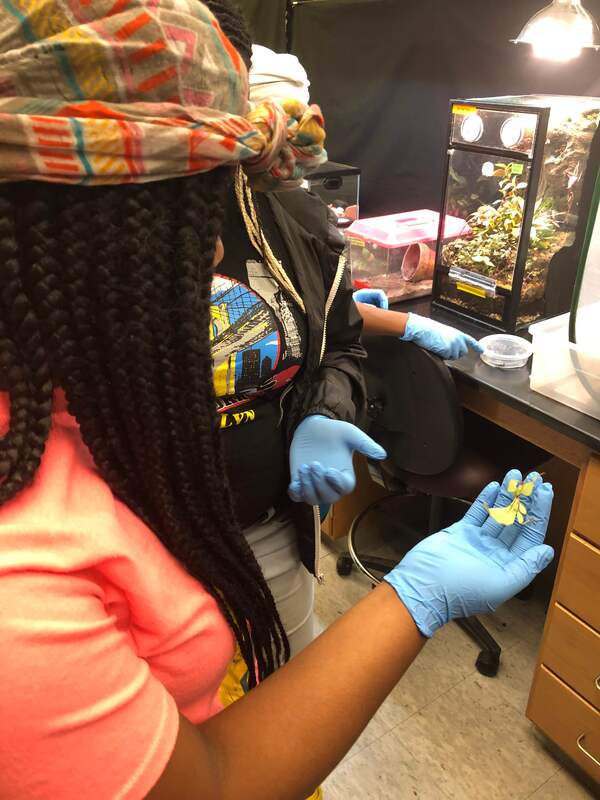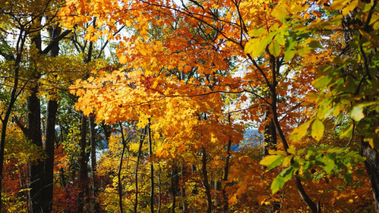What we don’t know could hurt us: the mystery of pesticide use and consequences for insects11/27/2019
written by: Maria Cramer, PhD student, Hamby Lab and Veronica Yurchak, PhD student, Hooks Lab
Dr. Maggie Douglas, an assistant professor from Dickinson College, managed to stump most of a room full of entomologists when she asked them if pesticide use in United States agriculture was going up or down over time. There were a few embarrassed laughs, but Douglas reassured everyone; “It’s a complicated question. There’s disagreement in the scientific community.” Congratulations to Gussie MacCracken (PhD Student, Shultz Lab) whose paper is out in Biology Letters today! Her research extends the history of plant–mite mutualisms back another 25 million years.
Publication: "Late Cretaceous domatia reveal the antiquity of plant–mite mutualisms in flowering plants." https://doi.org/10.1098/rsbl.2019.0657 written by: Nancy Harding
On November 5th the Entomology Department conducted an educational community outreach event that provided hands-on experience with insects and other arthropods to 27 students along with a couple of their teachers (Karen McCabe, Dan Hatfield and Brenda Stephens) from Pocomoke Middle School. Dr. William Lamp welcomed and provided the students with a glimpse into the fascinating world of insects. An overview of the innovative and important research currently being conducted in the department was provided by the following: Anna Noreuil, Ph.D. student (Fritz lab) gave a presentation and hands-on activity regarding the northern house mosquito; Rachel Kuipers, Lab Assistant (vanEnglesdorp lab) gave an overview of the research to further understand the loss in honey bee colonies in the United States; Maria Cramer, PhD student & Dr. Torsten Schöneberg (Hamby lab) spoke to the students about the important relationship between lady beetles (predator) and aphids (prey); Alexander Forde, Ph.D.student (Gruner lab) and Todd Waters, Agricultural Technician Supervisor and caretaker of the department’s Insect Zoo, gave the students an opportunity to look at and hold native and exotic arthropods. Nancy Harding, Research Assistant, (Shrewsbury lab) and Todd Waters set up and coordinated the visit from Pocomoke Middle School. Feedback from the students and teachers was extremely positive (see Pocomoke Middle School facebook page). written by: Dylan Kutz, MS student, Lamp Lab
Whenever we see the words “genetically modified” in the news these days, they’re usually followed by two things: the word “crops” and a lot of controversy. Genetically modified crops or “GM” crops are crops that have had their DNA altered through genetic engineering to gain a desirable trait, such as pest suppression. While some fear the effects of genetically modified crops on human health, numerous studies have thoroughly debunked the myth that GM crops are dangerous to humans. Still, much remains unknown about whether insect-resistant GMO crops affect non-target insects after harvest, or even how they degrade after crops are harvested. Veronica Yurchak, a Ph.D. student working in the Hooks Lab at the University of Maryland’s Department of Entomology got to the bottom of these after-harvest mysteries in her master’s thesis. Written by: Anna Noreuil, PhD student, Fritz Lab and Maggie Yuan, MS student, College of Edu
Shaded headwater streams are often overlooked by the average hiker, who may only fleetingly consider how they might leap across them to avoid wet feet. However, these streams are critical to aquatic and terrestrial ecological food webs and shouldn’t be simply ‘jumped’ over in terms of research. These food webs illustrate the connections and interactions that can exist between many different species in a natural community. In these illustrations, we can describe the transfer of ‘food energy’ in a system from one group of organisms to another. For example, plants and algae use energy from the sun to grow, which is eaten by herbivores, who will, in turn, be consumed by carnivores. When the sun provides the initial source of energy for the food web, it is said to be a green food web. In contrast, if the system receives little energy input from the sun, and is instead sustained by dead organic debris (utilized by decomposers), it is a brown food web. One common example of a brown food web here in Maryland is a shaded stream in a forest ecosystem. Written by: Maggie Lewis, PhD Student, Hamby Lab and Tais Ribeiro, PhD student, Espindola Lab
Do you know the bitter taste of kale? Or the spicy flavor of mustard greens? These flavors are created by the plants often for defending against herbivory. These chemicals are non-essential to the plant’s growth, with diverse properties and classes, such as alkaloids and terpenoids. Herbivores might find the taste too bitter – and they have no salad dressing to mitigate that – and avoid to feed on it, being the plant protected against their attacks. These compounds could be even deadly! But, just like the bitter tea you drink when you have a stomach ache, they can also have positive and medicinal properties, including anti-fungal and anti-parasitic effects. Although secondary metabolites are synthesized throughout the plant, they exist at different concentrations in different tissues. They can even be present in nectar and pollen, which could affect pollinator visitation and behavior.
written by: Ted Striegel (MS student, Hawthorne lab) and Graham Stewart (MS student, Palmer lab)
Dr. Joe Russell is a senior scientist at MRIGlobal, a nonprofit contract research institute that conducts research on a wide array of topics (including chemical and biological surveillance, biosafety and security). The institute receives much of its funding from contracts with the U.S. Department of Energy and Department of Defense. Dr. Russell had a circuitous academic path to MRIGlobal, including time spent studying astrophysics and analysing marine sediment samples. His talk centered on a new technology developed by the institute - the Mercury Lab. |
Categories
All
Archives
June 2024
|
Department of Entomology
University of Maryland
4112 Plant Sciences Building
College Park, MD 20742-4454
USA
Telephone: 301.405.3911
Fax: 301.314.9290
University of Maryland
4112 Plant Sciences Building
College Park, MD 20742-4454
USA
Telephone: 301.405.3911
Fax: 301.314.9290





 RSS Feed
RSS Feed




